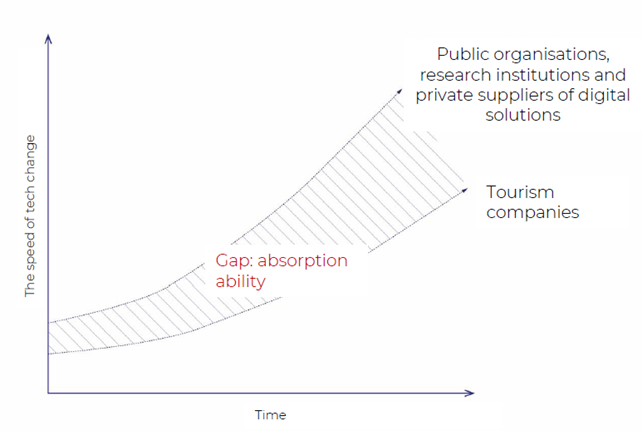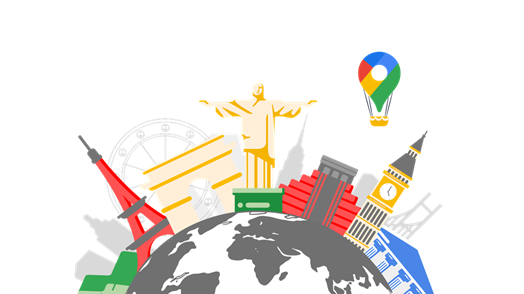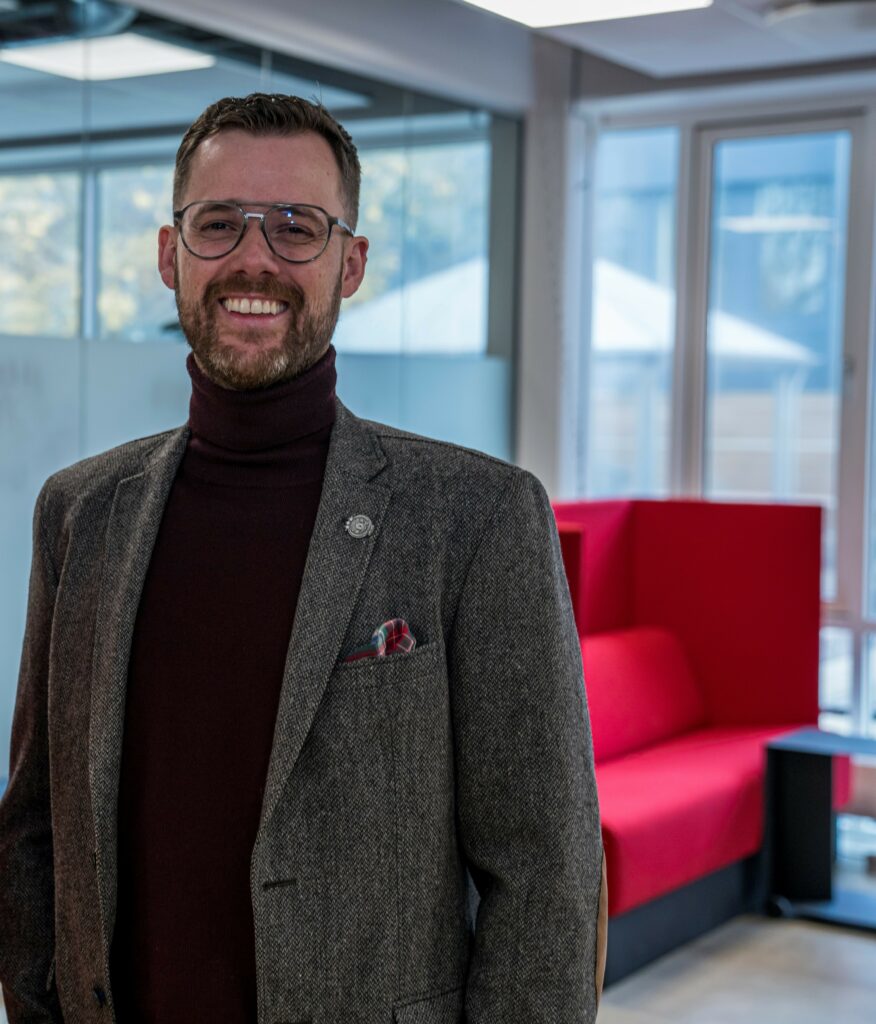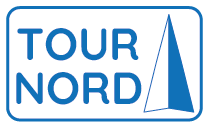Guest Post by Christian Dragin-Jensen, Senior Research & Business Development Specialist , at Business Academy SouthWest, Denmark.
At the backdrop of TourNord’s 1st network meeting in Esbjerg in late 2021, we were presented with a fascinating insight by Alice Bank Danielsen from Danish Coastal and Nature Tourism – namely the significant schism there exists between educational institutions’ understanding of digital competences in the tourism sector, versus the actual reality. It seems, at least in Denmark, that educational institutions have a perception that the necessary skills exist with practitioners to navigate the increasingly complex world of digital tools needed to cater to digital savvy guests, whereas the reality is quite the opposite. Following a report from Kvistgaard & Hird (2019), there is a significant gap in the absorption ability of adapting to tech changes in the tourism field between public organizations, research institutions and private supplier of digital solutions compared to that of tourism companies (figure 1). This is particularly the case for SME companies (small and medium-sized enterprises).

The same report also highlights that these tourism companies wish to work on becoming digitally adept, yet only find the time to experiment and ‘test the waters’ in the off-season (namely the winter months), signifying that the output generated is not seen as a strategy or competence, but rather about here-and-now solutions and process coincidences, thus resulting in a fragmented and unsystematic smattering of actions.
With the industry increasingly depending on digital technologies for providing services and products for digital citizens, this is a worrying predicament for tourism – particularly Nordic Tourism as we are already considered as expensive destinations. Does rising requirements in digital competences mean a further price hike, or equally problematic – a drop in quality and variety of service and products offered? In this post, I don’t attempt to offer a panacea to such a wildly complex solution, and where a plethora of stakeholders exist. Instead, I see this post as a platform for discussion – particularly for educational institutions, how we define this issue, and what our role should be in addressing this gap.
Are we speaking the same language? Defining digitalization and the skills that come with it
Digitalization, much like innovation and sustainability, have become mainstream words in almost all business and educational circles – while mainstream, these are complex subject matters, which therefore make it much harder to pinpoint what we mean when we say digitalization – especially in a tourism context.

An EU initiative, SmartTourismCapital, has defined digitalization as offering “innovative tourism and hospitality information, products, services, spaces and experiences adapted to the needs of the consumers through ICT-based solutions and digital tools” (European Union, 2019, p.7). In short, offering a superior tourism experience through ICT (Information and Communications Technology) and digital tools, tailored to the needs of our guests. While simple in spirit, approaching this in practice (and knowing when you are succeeding) is much murkier. A potential cause for this is trying to define what we mean by digital skills, tools, and experiences:
Photo source: Google’s The Keyword
- Are there certain experiences which are more digital-prone, or are digitally ‘critical’ for securing positive guest experiences?
- What constitutes a digitally-skilled employee in tourism? Is it knowing how to engage guests on social media, building an integrated website, or working strategically with data? Does it depend on where in the tourism value chain the employee works?
- Is digitalization about making employees life easier, so that they can focus on the critical aspect of personal service? Or is it about making the guest’s life easier? Maybe both?
Alice Bank Danielsen’s presentation further highlighted that many of the tourism companies identified digital activities as marketing initiatives, and it was in these areas that particularly SME’s struggled to make time work with these initiatives systematically and strategically. While incredibly important, this only sheds light on part of the digital skills divide. Research by Carlisle et al. (2021) has identified the need for a host of digital skills across tourism sectors in Europe, as seen below.
Tour operators/travel agents
Skills related to digital marketing and social media, including the role of influencers. Analytical skills and making sense of big data was seen as important, yet more as a requirement for managerial and leadership level (as opposed to operations).
Destination Management Organizations (DMO’s)
Rather than providing information, DMOs see a need in the future to provide inspiration and experiences for visitors. They need to act as consultants to tourism companies in their destination, and to aid them to attract (new) target groups. This means supporting digital developments particularly within community management and marketing. Moreover, this requires digital analytical skills to provide data-driven analytics and marketing, and to conduct studies of tourism and trend analysis. To summarize, the digital skills needed here can be encapsulated as business intelligence, both on an operational and strategic level.
Accommodation Providers
A blend of both marketing and operational digital skills was identified as critical. OTA’s and online booking portals will continue to dominate the market, and an online presence is a must to secure financial growth. While accommodation providers acknowledged the value of younger employees’ knowledge of social media, they found business communication skills to be lacking – in other words, writing skills to produce valuable content.
Rapid advancements in operational software, ranging from PMS (Property Management Systems) to CRM and hotel systems (e.g., Opera) are also seen as necessary. A leap forward in app-based programs, for example for housekeepers, is also seen as required digital skills. Hands-on skills on how to work technical equipment for accommodation providers who also host events (projectors, video equipment, sound systems, etc.) was seen as necessary.
It is quite clear for accommodation providers that there is wide range of digital skills needed, from both a hard- and software position. For SMEs, particularly family-driven entrepreneurial providers, this is quite a wide-range palette of skills necessary, and is justifiably, a digital jungle to overcome!
Visitor attractions
Was seen as lagging behind with other tourism companies, particularly with the use of big data, online marketing, and social media management. The most critical reflection was that at the moment, technical staff such as housekeepers or gardeners do not need digital skills, yet it that it was only a matter of time before every employee needs to have digital skills (or at least, a working knowledge of digital tools), as they will be tantamount to not only operational excellence, but to improve the visitor experience as well.
F&B Operations
Employees foresee a significant shift in the food and beverage sector, as the restaurant industry has already begun a much-needed digital transformation to keep up with the modern guest. Changing eating habits, a drive for better gastronomic experiences, and an increased focus on local produce and quality, has created significant ripples down the restaurant supply chain, resulting in restaurants having to adjust their core offerings to match the digital guest.

What can we as educational institutions do?
Based on Alice Bank Danielsen’s comments and the Kvistgaard & Hird report, it is quite clear that the first necessary course of action is to instigate a dialogue with practitioners. We are, at the moment, sitting in our ivory tower, slightly out of touch with the lay of the land. This dialogue needs to be systematic and strategic (much like working with digitalization!), as technologies and demands are continuously evolving. This would also allow us to tailor courses not only to our students, but also to courses for continuing education (i.e., practitioners in the field, looking to upgrade their skillset). I believe that, tailoring, will be the critical factor for success in navigating the digital jungle for both current and prospect employees in the tourism sector. As Carlisle et al.’s research highlighted, different skills are needed for different sectors, and we simply cannot lump all these skills into broad categories of operational digital skills and marketing digital skill for all sectors. Create courses specifically for accommodation providers, DMO workers, visitor attractions, etc. to make sure you can pinpoint the right skills. For both students and continuing education participants, show them how to structure this strategically and systematically within their type of organization, so that it doesn’t result in process coincidences – an unsystematic smattering of actions.
To summarize:
- Increased dialogue (strategic and systematic) between educational institutions and pracitioners.
- Fine-tune digital skills classes/courses based on specific sectors (maybe even jobs?) within the tourism industry.
- Continuously tailor courses to match digital demands of guests.
- Teach students and practitioners how to create and systematically use a digital strategy.
References
Carlisle, S., Ivanov, S., & Dijkmans, C. (2021). The digital skills divide: evidence from the European tourism industry. Journal of Tourism Futures. https://doi.org/10.1108/JTF-07-2020-0114
European Union. (2019). European Capital of Tourism – Guide for Applicants.
Kvistgaard, P., & Hird, J. (2019). Vi arbejder mest med digitalisering om vinteren: En kvalitativ analyse af nordjyske turismevirksomheders digitale modenhed som kilde til øget vækst i nordjysk turisme. Retrieved from https://www.e-pages.dk/aalborguniversitet/756/html5/
